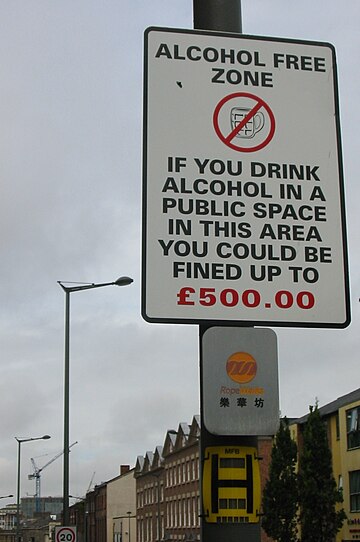An alcohol-free zone, or dry zone, is a geographic area, location or establishment where the public consumption and sale of alcoholic beverages is prohibited.[1][2] Alcohol-free zones have been established in some areas to address problems with drinking- and binge drinking-related crime, antisocial behavior, assaults and disorderly behavior.[3][4] Alcohol-free zones have been opposed in some communities, such as in Bath, England, which has "a tradition of open-air bars and restaurants."[3]

Alcohol-free zones
Australia
In New South Wales, Australia, some streets are designated as alcohol-free zones, which is demarcated with signage stating such.[5] Police may issue a warning to violators, and those who continue to drink can be fined and have their alcoholic beverages seized.[5] Many parks in New South Wales are designated as alcohol-free zones.[5] Bondi in New South Wales, Australia established an alcohol-free zone in the city in 2004 in efforts to reduce assaults and antisocial behavior influenced by street drinking.[3]
As of April 2016, Sydney, Australia has over 60 alcohol-free zones.[1] The City Council of Sydney proposed to eliminate the alcohol-free zones in April 2016.[1]
Azerbaijan
Alcohol-free zone networks have been established in areas of Azerbaijan since at least 1996.[6] These zones are located in areas such as cafes, tea shops and recreation centers.[6]
England

The first alcohol-free zone established in the United Kingdom was in Coventry, England in 1988.[7] Initially, the entire city center was declared to be an alcohol-free zone.[7] The zone was later expanded to include the entire city.[7]
Boston, Lincolnshire established a street drinking ban in January 2015 to address concerns with the antisocial problems associated with public alcohol consumption.[8] The street drinking ban includes the town center and other areas.[8] Under rules of the ban, those caught drinking in these areas can be fined £100 for a first offense.[8] A second offense within six months after having committed a first one can be fined up to £500.[8] Additionally, those that are requested to stop drinking and continue to do so can receive a fine of up to £500.[8] In January 2015 to commemorate the event, various town council members and city police attended an event where cans of beer were poured down a city street drain.[8]
In 2009, Knowsley, Merseyside established alcohol-free zones in some of its parks to address problems with binge drinking-related crime and antisocial behavior.[4] Drinking in licensed drinking establishments was not affected by the zones.[4]
Liverpool, England has some alcohol-free zones in areas of the city.[9]
India
The entire region of Attappadi, Kerala, India was established as an alcohol-free zone in 1996 by Chief Minister AK Antony.[10] Despite the ban, alcohol has been illegally brought into the region by community residents who travel to Annaikatti to purchase liquor from TASMAC stores.[10]
United States
Some parks and recreation areas in the United States are alcohol-free zones, such as in Johnson County, Iowa, where alcohol consumption is allowed in some park and recreation areas but not others.[11] For example, alcoholic beverages may be consumed in some day use areas and campgrounds in parks, but not in beach areas within some parks.[11]
The riverfront at Covington, Kentucky was established as an alcohol-free zone circa 1989 by Covington police.[12]
See also
References
External links
Wikiwand in your browser!
Seamless Wikipedia browsing. On steroids.
Every time you click a link to Wikipedia, Wiktionary or Wikiquote in your browser's search results, it will show the modern Wikiwand interface.
Wikiwand extension is a five stars, simple, with minimum permission required to keep your browsing private, safe and transparent.
